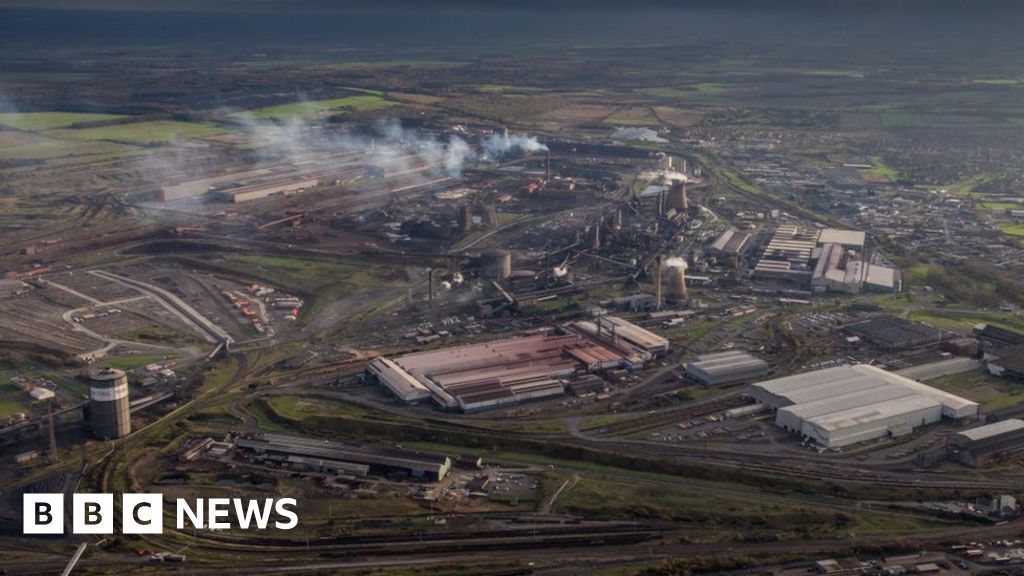
British Steel is on the verge of administration as it continues to lobby for government backing, sources say.
The UK's second-biggest steel maker had been trying to secure £75m in financial support to help it to address "Brexit-related issues".
If the firm does not get the cash it would put 5,000 jobs at risk and endanger 20,000 in the supply chain.
Company sources said that the direction of talks with the government would become clearer in the coming hours.
British Steel's main plant is at Scunthorpe, but it also has a site in Teesside.
The request for emergency financial support from the government is understood to have been reduced from £75m to about £30m.
The report said British Steel shareholder Greybull Capital and lenders had agreed to pump new money into the firm.
Unless a deal is reached by Tuesday afternoon, the firm could go into administration within 48 hours. EY would be expected to be appointed as administrators on Wednesday.
If a company goes into administration, then the insolvency practitioners appointed to run the business will try to rescue it by selling it, or parts of it, as a going concern.
But if that is not possible it will be liquidated, meaning that it will be closed down and its saleable assets will be sold.
In a statement, the Department for Business, Energy and Industrial Strategy (BEIS) said: "As the business department, we are in regular conversation with a wide range of companies."
In April, British Steel borrowed £100m from the government to enable it to pay an EU carbon bill, so it could avoid a steep fine.
Tough decision for the government
Sources close to Greybull Capital say its lenders have told them that unless they can secure a £30m lifeline they will pull the plug on British Steel tomorrow.
The timing of this could hardly be worse for the government coming as it does right before the European elections.
Cynics might suggest that Greybull is not unhappy with the timescale of the plea.
Business Secretary Greg Clark has a very tough decision, as I've already written.
The question may be whether the government can put this down to Brexit mitigation and tap the same source of contingency funds Chris Grayling disastrously used to procure emergency ferry capacity.
At least there would be an immediate dividend - to stave off the collapse of a firm that employs 4,500 people directly and has 20,000 more at risk in the supply chain.
However, having already lent £100m to cover a genuinely Brexit-related carbon emissions bill - further assistance to a private company struggling in a deeply challenged industry may be a precedent they would rather not set.
Slump in orders
Last Thursday, British Steel said it had the backing of shareholders and lenders and that operations continued as usual while it sought a "permanent solution" from the government to its financial troubles.
It is understood that along with administration, nationalisation or a management buyout are being discussed as fall-back options for the company.
British Steel's troubles have been linked to a slump in orders from European customers due to uncertainty over the Brexit process.
The firm has also been struggling with the weakness of the pound since the EU referendum in June 2016 and the escalating trade US-China trade war.
One of its biggest customers is Network Rail, 95% of whose rails are supplied by British Steel's Scunthorpe plant.
The recent history of the UK steel market goes back to 2007 when India's Tata conglomerate entered the market after acquiring the Anglo Dutch group, Corus. In 2010 it was renamed Tata Steel Europe.
After a difficult few years and restructuring attempts, Tata pulled out of the UK steel market, selling the Scunthorpe long products division to private equity firm Greybull Capital for a nominal £1.
Greybull's rescue came during the depths of the steel crisis in 2016 and saved more than 4,000 jobs.
It then rebranded the company as British Steel and recently returned it to profit.
On Monday, the government, trade unions and employers signed a UK Steel Charter in Parliament. The charter calls on the government and large companies to buy British to boost UK industry.
The GMB union said it had written to British Steel on Tuesday demanding that the firm works with the government to save the Scunthorpe steelworks.
GMB national officer Ross Murdoch said: "Given this latest speculation, these are understandably extremely difficult times for our members."
"Yesterday the government, alongside trade unions and employers, signed a UK Steel Charter at Westminster. They must now put their money where their mouth is.
"GMB calls on the government and Greybull to redouble efforts to save this proud steelworks and the highly skilled jobs."
The shadow minister for steel, Gill Furniss, called on the government to intervene, saying the UK steel industry was critical to the UK's manufacturing base and strategically important to UK industry.
"Administration would be devastating for the thousands of workers and their families who rely on this key industry in a part of the country which has not had enough support and investment from government over decades," she said.
https://www.bbc.com/news/business-48347371
2019-05-21 06:22:32Z
CBMiKmh0dHBzOi8vd3d3LmJiYy5jb20vbmV3cy9idXNpbmVzcy00ODM0NzM3MdIBLmh0dHBzOi8vd3d3LmJiYy5jb20vbmV3cy9hbXAvYnVzaW5lc3MtNDgzNDczNzE
Tidak ada komentar:
Posting Komentar